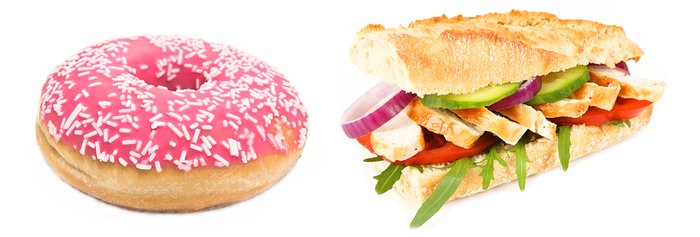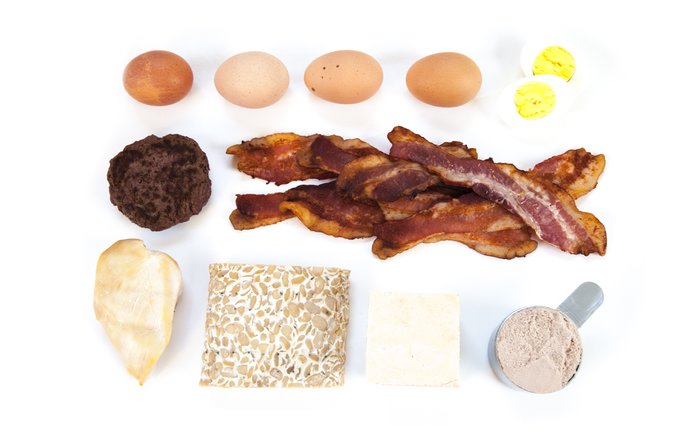Flexible dieting is not a new approach, but it's still one that receives pushback. Old-school competitors and hardcore meal preppers turn their noses up at flexible dieters because this "if it fits your macros" (IIFYM) approach allows, even encourages, eating unhealthy foods as part of a cutting phase. To detractors, this concept of fitting cheat foods into a meal plan just seems like, well, cheating.
But is this perception backed by science? Bill Campbell, Ph.D., CSCS, an associate professor of exercise science and director of the Performance & Physique Enhancement Laboratory at the University of South Florida, and his research team decided to put flexible dieting to the test.
"To the best of my knowledge, we did the first study in resistance-trained individuals with this flexible dieting paradigm," explains Campbell.
Here are the five key takeaways from his team's research to help you take a smarter, no-BS approach to flexible dieting.
1. It's As Healthy As You Make It
One of the biggest criticisms of flexible dieting is that it's not as healthy as stricter meal planning. After all, you're allowed to have cheat foods as long as they fit within your macronutrient ratio for each day—hence the IIFYM acronym. But just because someone eats a Snickers bar one day doesn't mean their entire diet is unhealthy.
According to Campbell, flexible dieting is a more useful educational tool for making smart food decisions than tracking calories alone, and the experience of flexible dieting may lead to greater long-term success.

"If you look at just calories, a donut might have the same total calories as a chicken sandwich, but the macros are completely different," explains Campbell. "I think everybody would benefit from tracking macros for a period of their life. You learn so much about making food choices."
Flexible dieting is as healthy or unhealthy as you want it to be, and if you're in a strict diet phase, your macros won't allow you to pig out on too many naughty foods, anyway.
Campbell's research shows the real value of this approach is how it teaches you to make healthier food choices while still fitting in less-healthy options every now and then. Tracking macros through flexible dieting is a great way to learn healthy habits without feeling deprived.
2. It Works Better When You Lift
The appeal of flexible dieting is obvious. In theory, you can eat whatever you want and still lose weight. Many take this concept one step further and start to believe resistance training is not as important for someone sticking to their macros, because that person is already dieting for better body composition.
Campbell and his team made it their goal to specifically study the effects of flexible dieting on a trained population, and the results were clear.

"If your goal is to lose weight, flexible dieting by itself is going to work great," says Campbell. "But, you're not going to change your body shape without resistance training. Without it, you'll just be a smaller, puffier version of yourself."
Resistance training makes all the difference when you're already lean and trying to go from a good physique to a great physique. "Lifting weights changes the contours of your physique," explains Campbell. "It's what will maintain your muscle mass during a diet."
The bottom line is that flexible dieting needs to be paired with resistance training if you truly want to change your physique.

3. The Scale May Not Change—And That's OK
When you're losing fat and gaining muscle, the numbers on the scale rarely tell the whole story.
"I'm biased because I'm a scientist," says Campbell. "But I would say to get more data than just the scale. Your physique may be drastically improving if you're gaining muscle and losing fat, but the scale may not change at all."
When you start tracking macros instead of calories, you're putting the ideal ratio of protein to carbohydrate to fat in your body, which can have a dramatic effect on your body composition. Hitting those ideal ratios encourages your body to build lean muscle and burn body fat.

This is precisely why the scale may not change at all: You could be adding muscle at a rate that nearly matches your fat loss, so the net change would be almost zero.
By emphasizing macronutrients over merely counting calories, flexible dieting could dramatically transform your physique without significantly changing the numbers on the scale.
As Campbell explains, "If you're gaining muscle and losing fat, your body is changing."
So embrace the idea that the scale might not change and use other methods (e.g., tape measure, calipers, bioelectrical impedance analysis) to collect more data and make sure flexible dieting is working for you.
4. Protein Matters Most
In his eight-week study looking at the effects of high versus low-to-moderate protein intake for female athletes, Campbell and his team found that while the high-protein group gained 4.5 pounds of muscle mass, the low-protein group gained only about 1.5 pounds—despite both groups following identical training programs.
The members of both groups were told not to restrict their carbohydrates or fats. In fact, participants were told not to restrict their calories at all.
As Campbell recalls, "My instructions were, 'Do whatever you want with carbs and fat—I don't care. Just don't diet.'"
Rather than account for the added calories in their diet by cutting fats or carbohydrates, the high-protein group ended up eating about 425 extra calories every day for the duration of the eight-week study. But instead of gaining fat, this group lost more body fat than the low-protein group, which was consuming fewer calories!

Campbell dubbed this finding the "protein aberration." It seems that as long as protein intake stays high, those few extra calories each day will not lead to increased body fat. You may not believe it yourself, but the results don't lie.
"As a scientist, I'm naturally skeptical," says Campbell, "but there's something going on here with protein."
5. A Better Long-Term Solution
The big appeal of flexible dieting is that it is so much easier than following a strict meal plan—and now it looks like it might be a better option long term as well.
Although the results showed no significant advantage to flexible dieting over rigid meal planning during the course of the eight-week study, Campbell made a surprising observation afterward.
"The really intriguing part came during the post-diet phase," he explains. "After 10 weeks of not doing anything, the group that was previously flexible dieting actually gained a significant amount of lean body mass as compared to the rigid group."
When it comes to long-term weight management and body transformation, adherence is key. It seems that, though flexible dieters show similar results to their rigid-plan counterparts in the short term, they have the advantage of better adherence in the long-term, and that may very well make all the difference.
Yes, some people will do much better with a more structured meal plan, but for those who can't stay on track but hate the thought of a strict meal plan, flexible dieting might be the solution.

